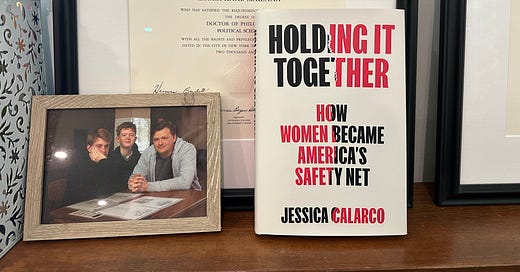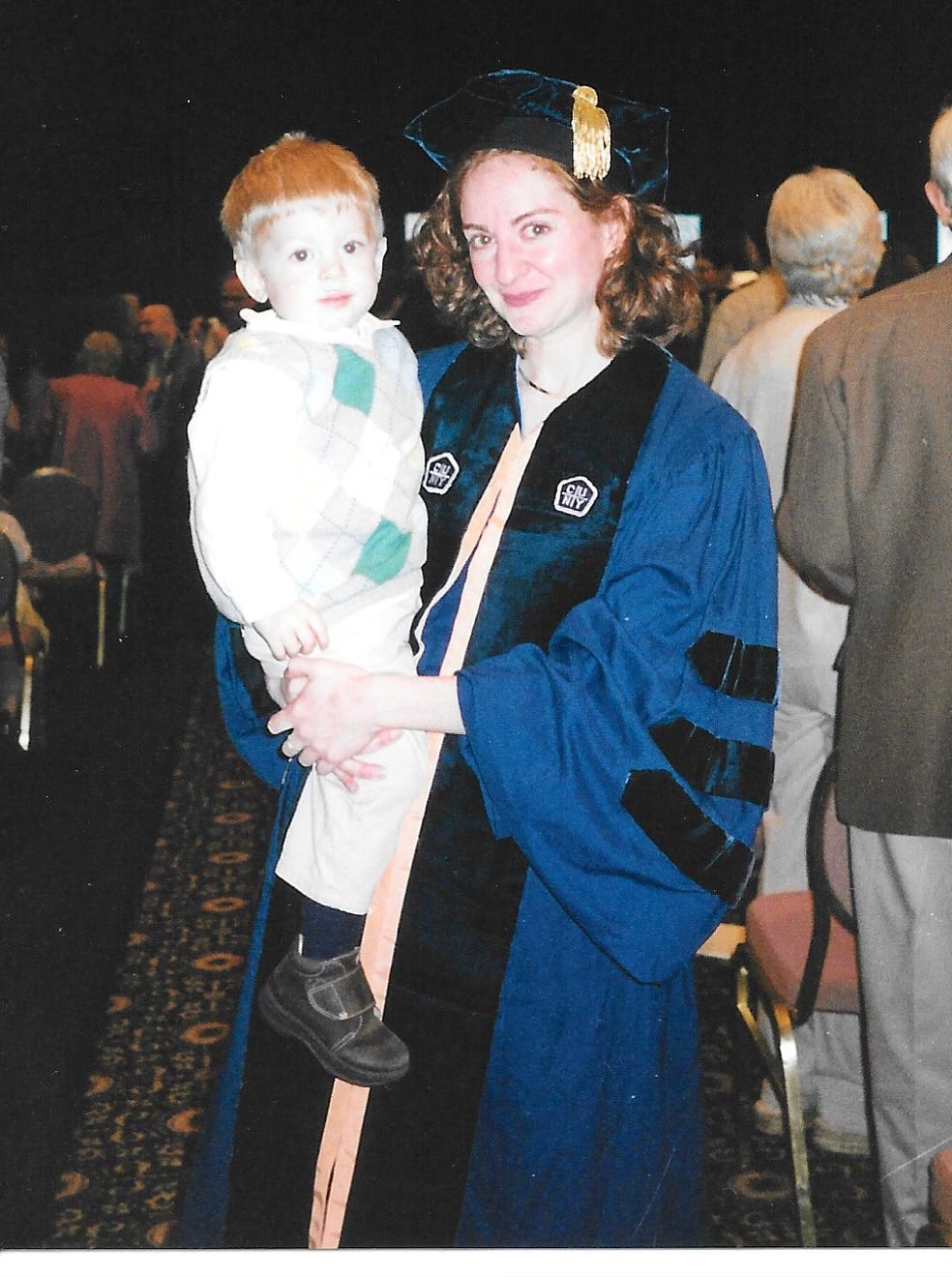After a first child is born or a parent falls ill, I think every woman at some point goes, “Holy Crap. You expect me to do what? How the hell is that going to happen? I have to go work!” I had that “Holy Crap moment” when my kids were babies, which coincided with the time that I was completing my PhD. In Holding It Together: How Women Became America’s Safety Net, Jessica Calarco, a sociologist at University of Wisconsin, is having her Holy Crap moment now.
She and a team of grad students interviewed and surveyed 4,000 parents to get a picture of how women were managing their caretaking duties. The answer is not very well. She tells the story of single mothers working three part time jobs with their kids in daycare all day. Others have to resort to welfare just to feed their children. Others feel forced to make sub-optimal career choices, which makes them vulnerable to changes in the economy.
Calarco does a great job telling these women’s stories. Too many women’s stories are never heard, so I appreciate that she honors their sacrifices and provides important details about Food Stamps and medical insurance. However, she blames the situation on right wing “engineers and profiteers,” when the blame should be spread around more broadly. She also focuses too specifically on the caretaking of young children, and doesn’t grasp the full extent of caretaking that women do.
Eight months pregnant, my son had a front row seat for all my interviews and data collection for my dissertation. Later, I wrote up all 200 pages when he napped. When I gave a half-hearted attempt at finding a tenure track job later that year, I was again eight months pregnant with my second kid.
Inconveniently, my husband was finishing his grad studies at the same time, so when Jonah was born, we had an income of $6,000 from Steve’s two adjunct classes at Bronx Community College. My folks helped us out. We lived cheaply in a four-floor walk up in Washington Heights. And we relied on WIC to pay for milk and cheese and cereal.
After it became obvious that there was no way that the two of us could find employment in academia in the same state — with a history PhD, Steve would have been lucky to find a job anywhere — we made a strategic decision for Steve to jump to Wall Street, and I would pick up all of the pieces. And that’s when I started reading every book about feminism and the economy I could find at the NYC public library.
My Holy Crap moment also coincided with the birth of feminist blogosphere, where myself and so many of other women had a primal scream on the Internet. We talked about books that explored this topic, like The Second Shift and the Price of Motherhood, when I wasn’t walking my kids to the neighborhood playground and teaching a grad school class at Columbia, which paid me $3,000 for the entire semester. And I was still doing academic research on my own, and paying for my own attendance to academic conferences so I could possibly put myself on the national job market the following year.
So, I really understand the women that are the focus of Jessica Calarco’s book. I know exactly the bad choices that they face. I know exactly what it feels like to apply for WIC. I know exactly what it feels like to be totally exhausted. I’ve done the childcare math myself. I know how childcare + transportation + expenses > Salary.
Not much has changed in the twenty years since my kids were young. Calarco covers much of the same territory as a previous generation of writers and bloggers. The problem is baked into our system, which defies any pat answers or ideological bad guys.
Calarco really wants a bad guy. I don’t blame her. It makes for a better story. She tries to blame the status quo on right wing “engineers and profiteers.” She doesn’t offer a whole lot of evidence to back up those claims, because the focus of her research is on the victims, not DC people or business CEOs. So, that part of her book is a bit of a reach.
Her research covers the COVID years, yet incredibly fails to discuss the incredible toll that school shutdowns had on parents. For one and a half years, a friend of mine struggled to get six-year old twins with learning differences and attentional problems to focus on two computer screens at the same time, while her three-year old son ran around the house looking for attention by jumping on the kitchen counters.
Like my friend, all parents in my state were given this job, without their consent, by the school district, democratic leaders, and teachers’ union. Our superintendent sent us happy little newsletters every week with his wife’s pie recipes to pretend that we were all having a grand adventure. Let me tell you, it was not a grand adventure. Our lives pretty much sucked the whole time. I wrote very little during that time.
The only reason that society didn’t come to a grinding halt during the pandemic was women. We educated our kids. We quit our jobs. We checked in our parents. We held society together. But, incredibly, Calarco doesn’t address how the education safety net, which isn’t run by right wing engineers or profiteers, totally failed us.
Trigger warning: In the Introduction, she explains that they located subjects for this research at prenatal clinics. She adds a footnote that points out to readers that not all women experience pregnancy and that not all people who experience pregnancy identify as women. If you have a poor gag reflex, just write “ugh” in the margins and keep reading.
While I disagree with Calarco’s simplistic world view, I actually don’t think she goes far enough in her critique of the system. Women are the safety net way beyond the early childhood years.
Every day, I talk to women who are tasked with raising their children and young adults with disabilities. It has become something more than I just do occasionally. It’s something that I do 24/7. It’s my job and vocation. Just this month, I’m trying to finish a book on the topic, running a parent support group, consulting parents privately, meeting with disability groups in the community, and writing two newsletters for parents. Once the book is done, I’ll return to running online webinars.
Women with disabled kids are entirely abandoned by society. They can never just drop their kids off at a school with the assurance that their kids are educated and safe. Yes, they aren’t even sure that their kids are safe. Imagine that. Then after school, there are no clubs or sports or scouts for them. The after-school program at their school won’t take their kids. They drive their kids to additional therapy that may or may not be covered by health insurance.
When their kids leave public school, the state completely walks away. For the first time, women are informed that watching their young adults is their full time job, for which they will be paid a sub-minimum wage. Since there are few programs for those kids, many disabled people just end up sitting on their parents’ sofa all day.
For a while, I tried writing articles and book proposals aimed at telling the general public about the dire situation for disabled people and their mothers, but I’ve given up. Nobody cares from any political party or ideology or religion. I’m done. Instead, I’m writing a book for the mothers, telling them how to hack the system to make it work for them. Others don’t care, so I’m not writing for them anymore. I’m writing for women like me.





Does she discuss eldercare at all? Talk about women acting as a safety net!
You go girl!